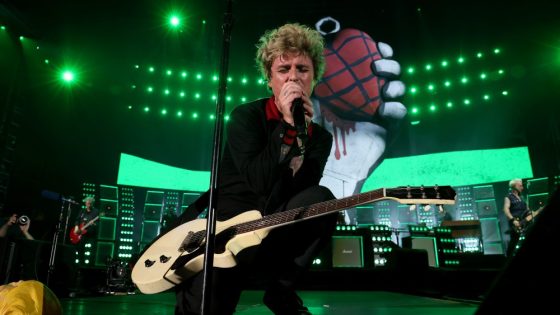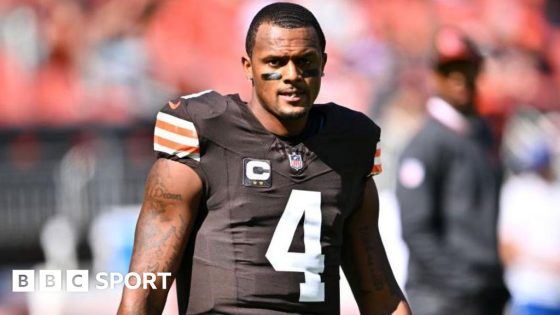There’s something to be said about aging gracefully in rock music. Coming of age as a punk rock group whose adolescent despondence became the rallying cry for a generation of fans and acolytes alike can quickly wither on the vine. Just as soon as a star rises, so do the stakes surrounding it: Can a band predicated on an anti-establishment ticket maintain its momentum far beyond its foundational era, when the establishment itself becomes the engine for its continued success?
For Green Day, now 30 years past its breakthrough third album “Dookie,” the answer is clear. The group, which brought its Saviors Tour to Los Angeles’ SoFi Stadium last night, mapped the fervor of its youth — pyrotechnics, stage jumps, unwavering energy — to a venue as maximalist as they come, from the five tiers of sold-out seats to the $125 passes just to park in the adjacent lot. But the California natives harnessed their club-rearing early days with ease. As they ran through the entirety of “Dookie” and “American Idiot,” the former released in 1994 and the latter a decade later, they performed with intensity and a pitch-perfect allegiance to the original records with a 20-something hunger, as if time itself had been frozen, at least for one night.
Chalk it up to the showmanship of the core constituents, counting lead singer Billie Joe Armstrong, bassist Mike Dirnt and drummer Tré Cool. As they played for a breathless two-and-a-half hours, they nailed every note, every chorus-driven song, with accuracy and intent. The spirit of what propelled Green Day beyond the grunge-rock that dominated the early ’90s permeated through the performance, from the calls for singalong to Armstrong’s mascara-penciled shifting eyes between verses, as if to punctuate the wild currents of the tracks themselves.
With that, the stinging bluntness of “Dookie” hasn’t dulled over time. Armstrong’s meditations on masturbation and despair still felt electrified on “Longview,” while the manifestations of anxiety resonated true with “Basket Case.” Those sentiments were loudly welcomed as the band felt its way through the album, the audience rapt with each song. The crowd, expectedly, consisted largely of millennials eager for a nostalgic battery charge. But it was equally dotted by adolescents, some young enough to be hoisted onto their parents’ shoulders wearing noise-canceling earmuffs.
That intergenerational appeal is a testament to the durability of their songwriting and performance abilities. “Dookie” arrived with sharp melodies and songs brimming with hooks. And when they transitioned into “American Idiot,” after Tré pranced about the stage in a leopard robe singing “All By Myself” and the band shredded “Brain Stew” and “Know Your Enemy” with a fan on stage, the connection between eras rang through as though a decade hadn’t divided them. Each record carries a pop-rock sensibility that’s specific to Green Day — even the sappiness of “Wake Me Up When September Ends” and “Boulevard of Broken Dreams” felt relative to the quick-strummed chords of their brattier hits.
None of the show would carry the same effervescence without Armstrong, who at 52 years old is as virile and agile as ever. It was humbling to see the level of spryness he’s maintained. He commanded the audience without breaking a sweat; his vocals were as nasal and fine-tuned as ever, and his boyish good looks remained pristine. To flit about the stage with such spark, more than three decades after starting his career, was a lesson not just in resolve but also in maintenance.
At that, the Saviors Tour could have been a nostalgia play, and in most ways it was, from the opening sets of Rancid and Smashing Pumpkins to a headlining set entirely consisting of albums celebrating decade-old milestones. But Green Day hasn’t lost any of what made the group such an enduring force. If anything, it’s a reminder that good art may get commodified over time — small club shows, these aren’t — but that, when handled with top-tier professionalism, will continue to find its audience, no matter the time or place.
Source Agencies



